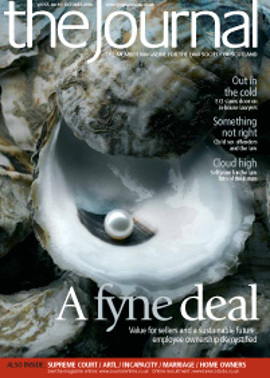Reviewing the review law
A recent licensing board decision has thrown the legality of parts of the Licensing (Scotland) Act 2005 into question. At a meeting in September, Fife Licensing Board accepted a preliminary plea in bar of a premises licence review proposal made in terms of s 37.
In terms of s 36 of the Act, a premises licence review application may be instigated by “any person”. This is in contrast to the 1976 Act which allowed suspension proceedings to be instigated only by persons who were competent objectors in terms of s 16. As anyone may object to a premises licence application, there is a logic to that. There is a mechanism in s 36(6) which allows a board to reject frivolous, vexatious or irrelevant applications. This followed recommendation 40 of the Nicholson Report, “A procedure should be devised to enable licensing boards to hold a hearing for consideration of any complaint brought to their notice by an LSO or by any person entitled to make observations or representations in respect of, or to object to, an application for a licence.”
Impartiality test
But s 37 allows the board itself to instigate the review. All Acts of the Scottish Parliament are supposed to be scrutinised to see that they are ECHR compliant. Does this pass the test? Let me declare an interest at the outset – this was a case of mine, so I am biased. Starting with first principles, can it be said that the board in these circumstances is an impartial tribunal? No one can be judge in his own cause. My argument was that this procedure, if it led to premises being closed down, would effectively have the board being prosecutor, judge and hangman. It might be argued that if the board members who take the decision to instigate the review are different from those who sit in judgment, this could cure the defect. My passing comments on that are (a) this would be a highly artificial state of affairs; and (b) it would be very difficult to achieve in practice. A 10-person board needs a quorum of five.
By a 4-3 vote, but on the recommendation of the convener, the board in this case agreed to abandon the proceedings. The prospect in cash starved times of an appeal to the Supreme Court was not an appetising one.
The Nicholson approach
I do not recall whether Sheriff Principal Nicholson commented on s 37. If he had, I suspect he would not have done so favourably. A whole appendix to his report, extending to 15 pages, was devoted to ECHR matters. Under the heading “An independent and impartial tribunal”, the committee examined that part of the 1976 Act which allowed a local authority to be a competent objector. Reference was made to the case of Findlay v United Kingdom (1997) 24 EHRR 221. The committee’s conclusion is that “in any case where an objection is taken by a local authority… the consequence, of course, is that members of the licensing board, who are also councillors in that local authority, are being asked to give an independent and impartial decision where one of the parties, as it were, is the very authority of which they are all members. In our view it is impossible to say that such a situation satisfies the objective test required by article 6 of the Convention and as explained in the case of Findlay”.
The committee also recommended that local authorities should not hold licences in their own name, another recommendation which was ignored by Parliament. Having on a number of occasions represented objectors to such applications, I certainly felt I was playing with a stacked deck.
Hope yet
In the current case the board is to be congratulated for grasping the point, and avoiding involvement in what I believe to be a thoroughly badly drafted bit of law. My faith in licensing boards will be further enhanced when they cease the appalling practice of the “pre-meeting”. How can their proceedings be open and impartial if cases have been discussed behind closed doors for an hour before the main meeting?
Tom Johnston, Young & Partners LLP, Dunfermline and Glasgow
In this issue
- The Scottish Government's EU and International Law Branch
- Akzo-Nobel: what you need to know
- The Edinburgh Declaration
- The curtailment of criminal appeals to London
- Society, justice and the greater good
- "We've aye done it this way" – not now!
- A deal to buy in to
- Land Register: what next?
- Designed to appeal
- Perpetrator or victim?
- An orchestra of instruments
- Two by two, by two
- Added capacity
- D-Day for legal aid
- Law reform update
- Compliance and the consent regime
- From the Brussels office
- Paper, pixel and process
- Ask Ash
- Draft proof
- Time for a fresh look
- Where to draw the line
- Reviewing the review law
- Expensive business
- Taking the full impact
- No discrimination?
- Scottish Solicitors' Discipline Tribunal
- Website review
- Book reviews
- It's not good to talk
- Getting to know you






